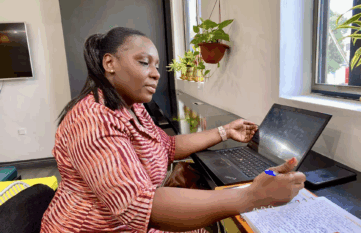Ghana’s gig economy is booming—but many young people and women still lack the skills, networks and support to access its opportunities. New training and mentorship programmes are closing this gap by building community, confidence and practical know-how. Together, they are shaping a more inclusive, people-centred digital economy.
Technology alone cannot drive digital transformation. It is the people and their intention that shape meaningful change. In Ghana, the platform economy offers immense potential for job creation and innovation, yet awareness and practical knowledge remain limited for both individuals and institutions.

To address these gaps, the Mentorship and Online Freelancers Training (OFT) programmes, originally developed and piloted by the Gig Economy initiative in Kenya and India, were adapted to Ghana’s local context. What sets these trainings apart is the focus on the connection to people. Participants, whether new entrants or those with niche experiences, gain not only digital and soft skills, but also a sense of belonging and a network that supports their professional growth. Together, they are building a resilient, empowered workforce that is ready to take on the opportunities in the digital economy.
Community-centred training: Building skills and belonging
Despite the exponential growth of Ghana’s gig economy sector, many youths still lack clear information on how to access this potential new source of income. The educational institution Afri-Consult addressed this gap by integrating the Online Freelancer Training (OFT) into their curriculum. The aim: to help learners navigate the world of platform work, the value of referrals, profile building, client communication, and fair working conditions—information that is otherwise very hard to come by alone.
Over six weeks, nine trainers and sixty trainees built both knowledge of the gig economy and a supportive community.
We came expecting to teach but, in the end, we also learnt a lot.
Isaac, trainer in the OFT
Empowering women through mentorship and safe learning spaces
Women in the gig economy face disproportionate challenges including access difficulties, job insecurity, irregular income, limited digital rights protections, and health and safety concerns. To address these barriers, the Gig Economy Initiative and the Digital Transformation Center (DTC) Ghana partnered with Soronko Academy to launch a Mentorship and Peer Learning Programme, connecting sixty mentees with twelve mentors. These safe learning spaces fostered networking, confidence, and open dialogue. As one participant noted, “I wanted someone I can be accountable to, and I now have that connection.” Another reflected, “Over time, the mentorship helped me grow my confidence and see myself as a valuable professional—not just a jobseeker.”
Sustainability is key to the mentorship approach. By building and maintaining judgment-free spaces for exchange and peer-to-peer support, participants completed the programme not only with practical tools, but also with a network that empowers them to take ownership of their success, overcome systemic barriers, and inspire others along the way.
Alongside the OFT and Mentorship Programme, the enthusiasm in the Ghanian gig ecosystem continues to grow with live events such as the Policy Makers Roundtable and Gig Talks taking place in Accra, Kumasi and Tamale.
We finished the programme as a team, and I know that we are not going to stop being in touch after the training.
Pearl, trainee in the OFT
To further empower workers and institutions in the gig economy reach out to [email protected] for the Ghanaian context or to [email protected] for more information.
Or check out the replication toolkits of both programs:








